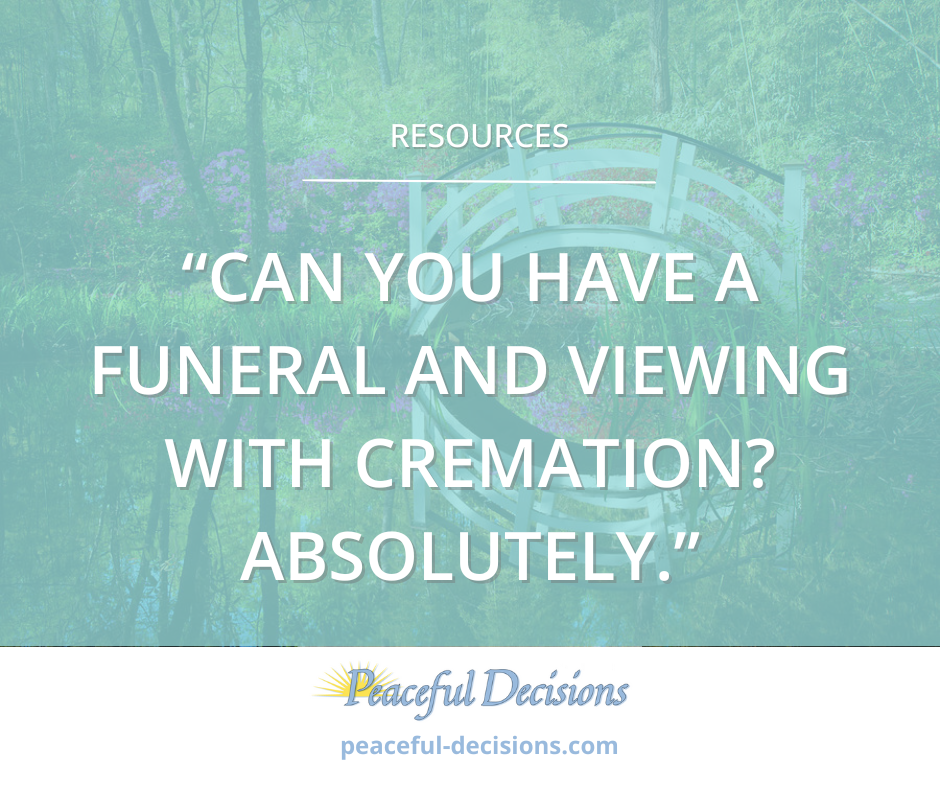
Can You Have a Funeral and Viewing with Cremation? Absolutely.
Many people wonder if choosing cremation means you can’t have a funeral or a viewing. That’s a common misconception. Cremation is a choice for final disposition—not a replacement for a meaningful service. Even with cremation as part of end-of-life wishes for a loved one or yourself, you can still plan a traditional funeral (with the body present), a viewing, or a memorial service with every bit of the care, ceremony, and comfort your family desires.
What Cremation Really Means
Cremation is one of several options for caring for a loved one after death (others include burial or interment, green burial, entombment, alkaline hydrolysis, natural organic reduction, and donation to science). Selecting cremation simply determines what happens after the service. The service itself (religious or secular, formal or casual) remains fully up to you. Military honors can also be included, just as they would be with a burial.
Service Options When You Choose Cremation
1) Traditional Funeral Before Cremation
If the body is present, it’s a funeral service. This can be held in a church, chapel, funeral home, or another meaningful venue. The deceased is placed in a casket that’s suitable for cremation. Some funeral homes provide a standard ceremonial casket used for the service, with a cremation container inside; afterward, the cremation container (with the deceased) is taken to the crematory. This approach preserves dignity and allows for all the rituals that matter to your family.
2) Memorial Service (Body Not Present)
A memorial service occurs when the body is not present—this can be held before or after cremation. Many families choose a memorial because it offers flexibility in timing and location: a favorite park, lakeside spot, restaurant, sports venue, hotel, or community space. You can incorporate an urn, photos, keepsakes, memory boards, and personal touches that tell your loved one’s story.
3) Celebration of Life, Scattering, or Private Gathering
Some families prefer a celebration of life, a scattering ceremony in a meaningful place, or a small private gathering. Cultural and religious traditions can be honored in any of these settings—cremation as a disposition doesn’t limit your ability to weave in the customs that matter to you.
Can You Have a Viewing Before Cremation?
Yes. Many families choose a visitation or viewing prior to cremation. Depending on the timing between death and the viewing, embalming may be recommended or required to ensure a comfortable and healing experience for attendees.
For many people, having time to see and spend time with their loved one helps with acceptance, rituals of farewell, and the grief process.
What to Expect in the Cremation Process
While every provider has their own procedures, a respectful, professional process typically includes:
- Authorization & Identification: Next of kin (or an authorized representative) provides permission and completes identification.
- Cremation Container: The body is placed in a cremation container selected by the family and compliant with state requirements.
- Cremation: The cremation occurs in a dedicated chamber, overseen by trained cremation professionals or funeral staff.
- Return of Cremated Remains: The cremated remains (“ashes”) are carefully collected and placed in an urn or container to be returned to the family.
Honoring Wishes—Yours or Theirs
Every family can choose the type of service that reflects their loved one’s values, beliefs, budget, and preferences. The most helpful time to make those choices is in advance… open conversations reduce guesswork and stress later. Recording your wishes ensures the service is exactly what you intend.
Planning tip: Use our planning guide to document your preferences for services, viewing, military honors, music/readings, venue, and disposition details so your family has clear direction when it’s needed most.
Quick FAQs
- Do we need a special casket for a funeral before cremation? Your funeral home can guide you. Many offer ceremonial caskets designed for use with a cremation container. After the service, the cremation container is transported to the crematory.
- Can we include military honors if we choose cremation? Military honors can be part of a funeral or memorial service regardless of the final disposition choice.
- Where can we hold a memorial? Almost anywhere people can gather—houses of worship, funeral homes, community centers, outdoors, or a venue that was special to your loved one.
- Who authorizes cremation? Typically, the next of kin or a legally authorized person completes identification and the authorization paperwork. Your provider will walk you through the process.
The Bottom Line
Cremation doesn’t limit your options; it expands them. Whether you choose a traditional funeral with viewing, a memorial service, or a celebration of life, you can create a meaningful tribute that honors your loved one and supports your family’s healing. If you’re considering cremation, take time to explore what feels right and record your wishes so your family has clear guidance when the time comes.